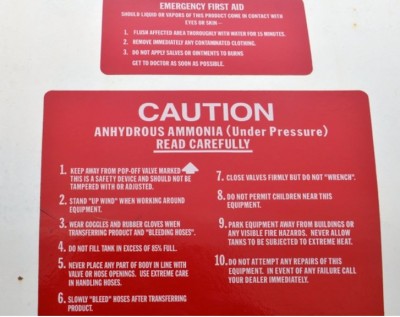13 Safety Tips for Anhydrous Ammonia

By Tom Bechman, Farm Progress
You're hauling an anhydrous ammonia tank through town and the right rear rim falls off the anhydrous wagon. Would you know what to do?
Can't happen to you? It happened to an Indiana farmworker recently. The secret is reducing the odds for these things to happen — and knowing how to react if they do.
"We have training programs to help clients understand why anhydrous ammonia must be respected and what precautions you should take," says Marty Huseman, safety director for Good Days Work, Brookston, Ind.
Recently, Huseman sent reminders related to working around anhydrous ammonia to his clients. Here are 13 anhydrous safety tips from Huseman:
1. Remind and retrain. Family members, full- and part-time employees, and new hires all need training and refresher courses on anhydrous ammonia safety, Huseman says. "You don't work around it every day, and it's easy to forget key points," he says. "Safety needs to be top of mind."
2. Smell it. Anhydrous ammonia is colorless, but it has a recognizable odor. If you smell it, identify the source immediately.
3. Understand its deadly love of water. Anhydrous ammonia has a strong affinity for water, and sucks it out from everywhere, including your eyes. Living tissue is destroyed quickly and will not heal.
4. Remember it's lighter than air. Vapor from anhydrous ammonia moves up into the atmosphere. However, high humidity traps vapor. When ammonia encounters moisture, vapor becomes heavier, settling in valleys and road ditches.
5. Protective gear is essential. Unvented goggles and a full-face shield protect you from a release, Huseman says. Rubber gloves impervious to ammonia protect you as well. A heavy-duty long-sleeved shirt, long pants and respirator are recommended.
6. Use water as first aid. It takes large amounts of water to neutralize effects on the body. Start water treatment immediately, Huseman says. Make sure you have water available. Check the water supply on the side of the anhydrous tank.
7. Never go through town. The first mistake the farmworker in the example made was driving through town. Take a route that avoids towns and people.
8. Don't make any stops. Did you know it's a violation of federal law to leave a nurse tank and towing vehicle unattended? Tow the tank straight from the retailer to the field — no exceptions!
9. Observe 25 mph speed limit. Anhydrous ammonia tanks carry a slow-moving vehicle sign for a reason, Huseman says. Top speed should be 25 miles per hour. Most tires on these trailers are only rated up to 25 miles per hour.
10. Secure safety chains. Make sure safety chains are crossed and secured. Use a properly rated hitch pin with clip or keeper. Inspect each time before pulling onto the road, Huseman advises.
11. Allow time to stop. Increase stopping distance for a partial or heavy load. If you're pulling with a half-ton pickup, you don't have the same braking equipment as a ¾-ton or 1-ton truck. Allow more following and stopping distance.
12. Close valves. Turn off tank valves and disconnect hoses before pulling onto the roadway.
13. Know wind direction. Be aware of your surroundings, including knowing wind direction. Always work upwind in case of an accidental release, Huseman cautions.
Upcoming Events
WNY Pastureland Conversion & Soil Health Field Day
July 16, 2025
Middleport, NY
Join American Farmland Trust for the Western New York Soil Health Field Day on July 16, 2025, at Zeliff Farm in Middleport, NY, from 9:00 AM-3:15 PM. Learn about pasture conversion, soil health benchmarking, biochar in grazing systems, and best grazing practices. Plus, enjoy hands-on demos with the NY Soil Health Trailer, drones, and cover crops! Check out the attached agenda for more information about the field day and REGISTER HERE. Zeliff Farms is a regenerative beef operation who has recently partnered with AFT on outreach and education to farmers including learning circles and evaluating biochar effects on soil health.
IPM Strategies to Protect Corn and Soybean Seed in NY
July 30, 2025
Hamburg , NY
SWNYDLFC and Cornell IPM are hosting a grower meeting to discuss integrated pest management strategies for protecting corn and soybean seed in New York.
FAMACHA Training for Sheep and Goat producers in Woodhull NY
August 13, 2025 : FAMACHA Training in Woodhull
Woodhull, NY
Join us for a discussion and hands-on training for internal parasite integrated pest management in sheep and goats. Certification is available to all students participating in the workshop.
Announcements
No announcements at this time.





